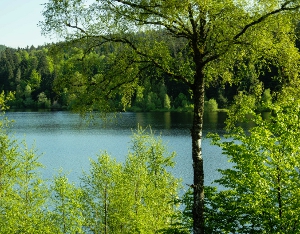Waterworks Forest
Water is our most precious natural resource. We need clean water as the air we breathe. In Germany every person uses about 50,000 l of water annually. About 70 percent of drinking water nationwide gained come from groundwater and managed forests. The forest ecosystem is the largest freshwater reservoir in Germany.
Mixed forests are best for the "production" of drinking water.
The forest cleans and filters the rainfall. Most groundwater and healthy drinking water occur in mixed forests with a high proportion of deciduous trees. The forest floor can - like a sponge - absorb and store water. In the upper 10 cm of the forest floor, the humus-rich layer, up to 50 liters of rain water per square meter can be stored. Fungi and numerous microorganisms in forest soils provide the "chemical" treatment of the water, so groundwater out of the woods usually can be used without costly purification for drinking. About one third of the German forests is a water protection zone.
The German Forestry promotes the "Waterworks Forest" by
- the abdication of clearcuts
- a vast abdication of synthetic chemicals in the forest
- the use of ground-saving work methods and machines
- protection of waters, source areas and bogs in forests
- preserving large contiguous forest areas
- reforestation and natural regeneration
- the development of semi-natural mixed forests.
The drinking water from the tap could not be offered in the desired quantity and quality without the cleaning and absorbing functions of the forest. Without forests there would be no water sustainability. German forestry is also focused on the water quality and storage function, otherwise there would be water shortages in Germany, as in more sparse forested regions of southern Europe.
Forest owners are usually not involved in the profits gaines from forest water. On the contrary, they suffer from water protection areas obligations. In addition, they have to pay high contributions to water and soil associations.







